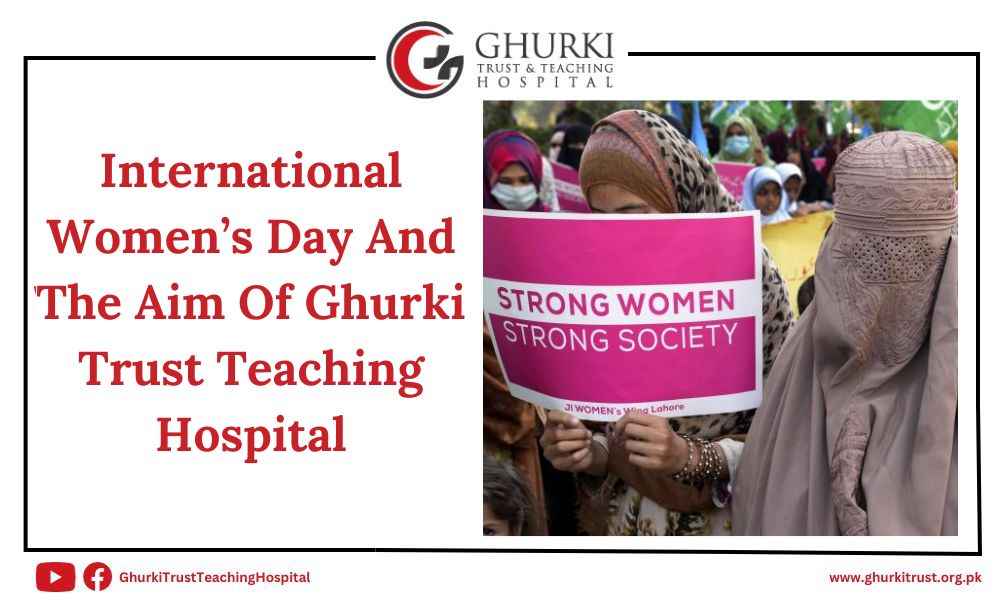8 March, International Women’s Day And The Aim Of Ghurki Trust Teaching Hospital

In Pakistan, the health of women is facing serious challenges, with reports showing worrying trends. For example, for every 100,000 births, 178 women unfortunately pass away due to complications related to pregnancy. Breast cancer rates in the country are among the highest in Asia, impacting thousands of women each year.
Additionally, issues like iron deficiency affect a significant number of women, further complicating their health during critical times such as pregnancy. On International Women’s Day, it’s important to highlight these issues and work towards solutions. Ghurki Trust Teaching Hospital is committed to improving women’s health through education, proper care, and support, aiming to make a positive change in the lives of many.
Women’s Health In Pakistan And Statistical Overview
In Pakistan, 78 out of every 100,000 women experience potentially fatal complications during childbirth or as a result of pregnancy-related problems with one of the highest rates of maternal death worldwide. With thousands of new instances reported every year, breast cancer is a primary cause of death and an increasingly common disease.
Furthermore, a startling 50% of Pakistani women suffer from iron deficiency, which has a substantial negative influence on maternal health and raises the country’s high rates of maternal death. These health problems heavily impact families and the healthcare system in addition to limiting women’s ability to fully engage in social and economic life.
International Women’s Day – A Platform For Rights And Recognition
Every year on March 8, the world comes together to celebrate International Women’s Day, which is a call to action for gender equality and the acknowledgment of women’s accomplishments in a variety of fields. This day, which began as a global labor movement celebration in the early 20th century, highlights the significance of women’s rights, particularly their access to health and medical attention.
This day recognizes the progress made in Pakistan and around the world in giving women equal rights, but it also draws attention to the continuous fight for fair access to medical care. The advancement of women’s health rights in Pakistan has been greatly aided by programs like the Lady Health Workers Programme, which provides vital medical treatment to poor and rural communities. Movements and charity groups that support reproductive rights, women’s health education, and the prevention of diseases like breast cancer are also still growing.
Ghurki Trust Teaching Hospital’s Role In Promoting Women’s Health
In Pakistan, Ghurki Trust Teaching Hospital is at the forefront of tackling the most important issues related to mother and child health. GTTH’s activities are more than a service; they are a lifeline for thousands of mothers and children who are in danger because they have inadequate access to high-quality healthcare. The hospital’s efforts in providing state-of-the-art care and specialized programs aim to reduce maternal and child mortality rates in the region significantly.
Comprehensive Gynaecology & Obstetrics Department
Since January 2000, the Gynaecology & Obstetrics Department at GTTH has been acknowledged for both its innovative medical techniques and its postgraduate training programs, thanks to the leadership of esteemed gynecologist Prof. Shaheena Asif. The department’s focus on improving women’s health care is demonstrated by its introduction of both diagnostic and surgical laparoscopies in 2003, as well as its integration of colposcopy and hysteroscopy into its services since 2004.
Bottom Line
Ghurki Trust Teaching Hospital is dedicated to continuing to be a light of hope and development in Pakistan as we commemorate International Women’s Day and consider the difficulties and achievements in women’s health. By means of all-encompassing healthcare, cutting-edge medical techniques, and committed initiatives, we aim to not only address but also overcome the challenges currently confronting women’s health.

